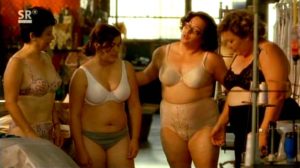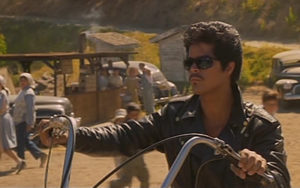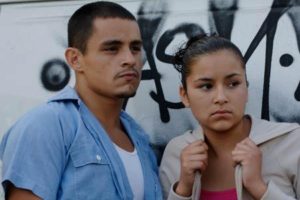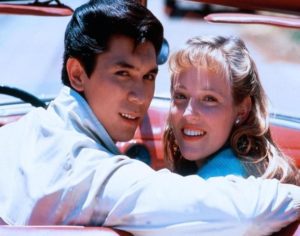 The movie, Real Women Have Curves has a variety of examples that were taught in our readings and films. The main examplesthat were shown in the film were what “women duties” are, the value of women and the importance of having value, and how Chicanos are seen in society. In the movie it begins with a teenage girl, Ana, cleaning the windows very angrily and then becomes even more upset when her sister, Estella, calls her because their mother is looking for her. When Ana goes to her mother she asks her what’s wrong and as they talk, her mother Dona Carmen says she isn’t feeling well and that Ana is going to have to cook breakfast for the men before they go to work. Ana responds by saying no because it is her last day of high school. Her mother calls her ungrateful and tells her that she is in pain but “struggles with it” the same way she did in raising her and taking care of the family, as they begin to argue the father intervenes. Throughout the whole movie Dona Carmen and Ana are constantly bickering because Ana does not want to do the stereotypical women job.
The movie, Real Women Have Curves has a variety of examples that were taught in our readings and films. The main examplesthat were shown in the film were what “women duties” are, the value of women and the importance of having value, and how Chicanos are seen in society. In the movie it begins with a teenage girl, Ana, cleaning the windows very angrily and then becomes even more upset when her sister, Estella, calls her because their mother is looking for her. When Ana goes to her mother she asks her what’s wrong and as they talk, her mother Dona Carmen says she isn’t feeling well and that Ana is going to have to cook breakfast for the men before they go to work. Ana responds by saying no because it is her last day of high school. Her mother calls her ungrateful and tells her that she is in pain but “struggles with it” the same way she did in raising her and taking care of the family, as they begin to argue the father intervenes. Throughout the whole movie Dona Carmen and Ana are constantly bickering because Ana does not want to do the stereotypical women job.
A few things that had been discussed in class was in Maria Hinojosa’s podcast of Family Values. This podcast talked about what it means to be a family, what the family values, and things they do and talk about to stay a family. This relates to the film because a lot of what Dona Carmen wants to do is forher family. In the beginning of the film there is a discussion she has with her husband about Ana and her role in the family. She claims it is Ana’s turn to take responsibility the same way she did when she was 13 and she compares it to Ana not wanting to cook, clean, work to help provide for the family, or work to help her sister in the factory and she’s 18. This discussion had been brought up because her English teacher in high school, Mr. Guzman, believes Ana should go to college because of the potential he sees in her and he stopped by her house to tell her parents this. And while Ana’s father agreed that he wants her to receive and education he also needs Ana to help support the family. Later that night when he and Dona Carmen discuss it she mentions that she can teach Ana too, that she can show her how to cook, sew, and take care of her children and husband. Everything that is “expected” of a women is shown throughout the film and when it relates to the readings it goes back to Richard Rodriguez’s, chapter one in Next of Kin, in the readings they discuss often that the woman is beneath the man and she should be teaching her sons they are to be in charge, and should have little household responsibilities and she is supposed to teach her daughters how to take care of her family, how to clean and how to provide.
The day Ana begins working at her sister’s factory she tells two other workers that her working at the factory is only temporary because she knew she did not want to work there and wanted to do something more. This interaction had gotten them off to a bad start because they began making fun of her and then that conversation changed to Normita, the “thinner and prettier” coworker getting married and Dona Carmen praising her and then telling Panchita, the “thicker and older” coworker that her getting bigger and bigger after getting married is probably what made her husband stop buying her clothes. In different occasions Dona Carmen also tells Ana that being big is not going to get her a husband and neither will all the talking back that she does. Throughout the film Ana begins to talk to a guy from school, Jimmy, and as they get closer and closer one night they decide to have sex and before they begin Ana turns the lights back on and tells him she wants him to know the real her. The next day after they had sex Ana had gotten out of the shower admiring her body and her mother notices whatshe is doing and says “you tramp…you lost your virginity didn’t you? Now you’re fat and a puta.” This part also reminded me of Rodriguez’s reading in chapter one, “In this context, it is easy to imagine the male penetration of, and ejaculation in, a woman’s body, the “natural” process that in turn reproduces the bronze bodies over which adult men ultimately take charge”(27).
Aside from this film showing how women should be act, and what their responsibilities are they also touch base on how Chicanos are viewed in society. When Ana is at her last day of school they show the class going around mentioning what they plan to be doing five years from now and they all mention all types of schooling they would be going through and Ana simply says she’ll be traveling Europe. This displays that Chicanos won’t go to college either because of grades and/or money. But, Mr. Guzman pushes those stereotypes to the side by being a Chicano teacher at Beverly Hills High School and when he tells Ana she has the grades and can apply for various scholarships. Another time we see how Chicanos are viewed in society is when Estella goes to talk to the head of the department store which she makes dresses for. She had gone to talk to her to try and receive an advance to keep things up and running but the lady (who is also Chicana) is put off as rude and not wanting to help. This portrays once someone (even of your own kind) once they make it to the top they begin to assimilate and act the same way most Caucasians do to minorities. These examples relate toEl Plan de Aztlan where they mention how Causcasians will try and get rid of us and how we have to stay as a unity.
This film as a whole shows how Ana speaks up for herself that women don’t have to always cook, clean, take care of the family. She demonstrates that regardless of how thin, thick, race, etc. you should be proud of yourself and own up to being you. That Chicanas have a lot to stand up for and should not settle for less simply because she is a minority. She shows that working hard and believing yourself can get you to various place just how she was able to get into Columbia University with a full scholarship. Lastly, she stands up against every stereotype that is thrown out about Chicana women as a whole.



 The movie, Real Women Have Curves has a variety of examples that were taught in our readings and films. The main examplesthat were shown in the film were what “women duties” are, the value of women and the importance of having value, and how Chicanos are seen in society. In the movie it begins with a teenage girl, Ana, cleaning the windows very angrily and then becomes even more upset when her sister, Estella, calls her because their mother is looking for her. When Ana goes to her mother she asks her what’s wrong and as they talk, her mother Dona Carmen says she isn’t feeling well and that Ana is going to have to cook breakfast for the men before they go to work. Ana responds by saying no because it is her last day of high school. Her mother calls her ungrateful and tells her that she is in pain but “struggles with it” the same way she did in raising her and taking care of the family, as they begin to argue the father intervenes. Throughout the whole movie Dona Carmen and Ana are constantly bickering because Ana does not want to do the stereotypical women job.
The movie, Real Women Have Curves has a variety of examples that were taught in our readings and films. The main examplesthat were shown in the film were what “women duties” are, the value of women and the importance of having value, and how Chicanos are seen in society. In the movie it begins with a teenage girl, Ana, cleaning the windows very angrily and then becomes even more upset when her sister, Estella, calls her because their mother is looking for her. When Ana goes to her mother she asks her what’s wrong and as they talk, her mother Dona Carmen says she isn’t feeling well and that Ana is going to have to cook breakfast for the men before they go to work. Ana responds by saying no because it is her last day of high school. Her mother calls her ungrateful and tells her that she is in pain but “struggles with it” the same way she did in raising her and taking care of the family, as they begin to argue the father intervenes. Throughout the whole movie Dona Carmen and Ana are constantly bickering because Ana does not want to do the stereotypical women job.
